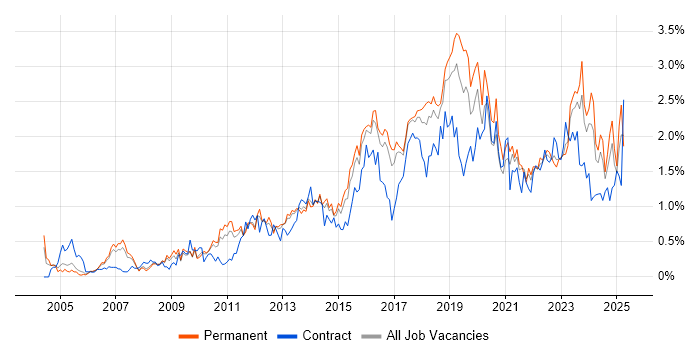Infrastructure Engineer
West Midlands > Birmingham
The median Infrastructure Engineer salary in Birmingham is £45,000 per year, according to job vacancies posted during the 6 months leading to 20 May 2025.
The table below provides salary benchmarking and summary statistics, comparing them to the same period in the previous two years.
| 6 months to 20 May 2025 |
Same period 2024 | Same period 2023 | |
|---|---|---|---|
| Rank | 82 | 103 | 108 |
| Rank change year-on-year | +21 | +5 | +31 |
| Permanent jobs requiring an Infrastructure Engineer | 27 | 40 | 25 |
| As % of all permanent jobs advertised in Birmingham | 1.94% | 1.44% | 1.32% |
| As % of the Job Titles category | 2.05% | 1.52% | 1.41% |
| Number of salaries quoted | 22 | 36 | 24 |
| 10th Percentile | £27,750 | £36,085 | £38,250 |
| 25th Percentile | £29,250 | £37,563 | £46,250 |
| Median annual salary (50th Percentile) | £45,000 | £50,000 | £50,000 |
| Median % change year-on-year | -10.00% | - | -4.76% |
| 75th Percentile | £48,000 | £61,000 | £57,500 |
| 90th Percentile | £59,500 | £65,000 | - |
| West Midlands median annual salary | £42,500 | £45,000 | £47,500 |
| % change year-on-year | -5.56% | -5.26% | +5.56% |
All Permanent IT Job Vacancies
Birmingham
For comparison with the information above, the following table provides summary statistics for all permanent IT job vacancies in Birmingham. Most job vacancies include a discernible job title that can be normalized. As such, the figures in the second row provide an indication of the number of permanent jobs in our overall sample.
| Permanent vacancies in Birmingham with a recognized job title | 1,318 | 2,631 | 1,768 |
| % of permanent jobs with a recognized job title | 94.68% | 94.44% | 93.15% |
| Number of salaries quoted | 771 | 2,138 | 1,360 |
| 10th Percentile | £31,750 | £31,250 | £31,250 |
| 25th Percentile | £42,500 | £41,063 | £42,500 |
| Median annual salary (50th Percentile) | £55,000 | £55,000 | £55,000 |
| 75th Percentile | £68,750 | £70,000 | £71,250 |
| 90th Percentile | £82,500 | £84,964 | £81,251 |
| West Midlands median annual salary | £51,887 | £50,000 | £52,500 |
| % change year-on-year | +3.77% | -4.76% | +5.00% |
Infrastructure Engineer
Job Vacancy Trend in Birmingham
Job postings that featured Infrastructure Engineer in the job title as a proportion of all IT jobs advertised in Birmingham.

Infrastructure Engineer
Salary Trend in Birmingham
3-month moving average salary quoted in jobs citing Infrastructure Engineer in Birmingham.
Infrastructure Engineer
Salary Histogram in Birmingham
Salary distribution for jobs citing Infrastructure Engineer in Birmingham over the 6 months to 20 May 2025.
Infrastructure Engineer Skill Set
Top 30 Co-occurring Skills and Capabilities in Birmingham
For the 6 months to 20 May 2025, Infrastructure Engineer job roles required the following skills and capabilities in order of popularity. The figures indicate the absolute number co-occurrences and as a proportion of all permanent job ads across the Birmingham region featuring Infrastructure Engineer in the job title.
|
|
Infrastructure Engineer Skill Set
Co-occurring Skills and Capabilities in Birmingham by Category
The follow tables expand on the table above by listing co-occurrences grouped by category. The same employment type, locality and period is covered with up to 20 co-occurrences shown in each of the following categories:
|
|
||||||||||||||||||||||||||||||||||||||||||||||||||||||||||||||||||||||||||||||||||||||||||||||||||||||||||||||||||
|
|
||||||||||||||||||||||||||||||||||||||||||||||||||||||||||||||||||||||||||||||||||||||||||||||||||||||||||||||||||
|
|
||||||||||||||||||||||||||||||||||||||||||||||||||||||||||||||||||||||||||||||||||||||||||||||||||||||||||||||||||
|
|
||||||||||||||||||||||||||||||||||||||||||||||||||||||||||||||||||||||||||||||||||||||||||||||||||||||||||||||||||
|
|
||||||||||||||||||||||||||||||||||||||||||||||||||||||||||||||||||||||||||||||||||||||||||||||||||||||||||||||||||
|
|
||||||||||||||||||||||||||||||||||||||||||||||||||||||||||||||||||||||||||||||||||||||||||||||||||||||||||||||||||
|
|
||||||||||||||||||||||||||||||||||||||||||||||||||||||||||||||||||||||||||||||||||||||||||||||||||||||||||||||||||
|
|
||||||||||||||||||||||||||||||||||||||||||||||||||||||||||||||||||||||||||||||||||||||||||||||||||||||||||||||||||
|
|||||||||||||||||||||||||||||||||||||||||||||||||||||||||||||||||||||||||||||||||||||||||||||||||||||||||||||||||||
